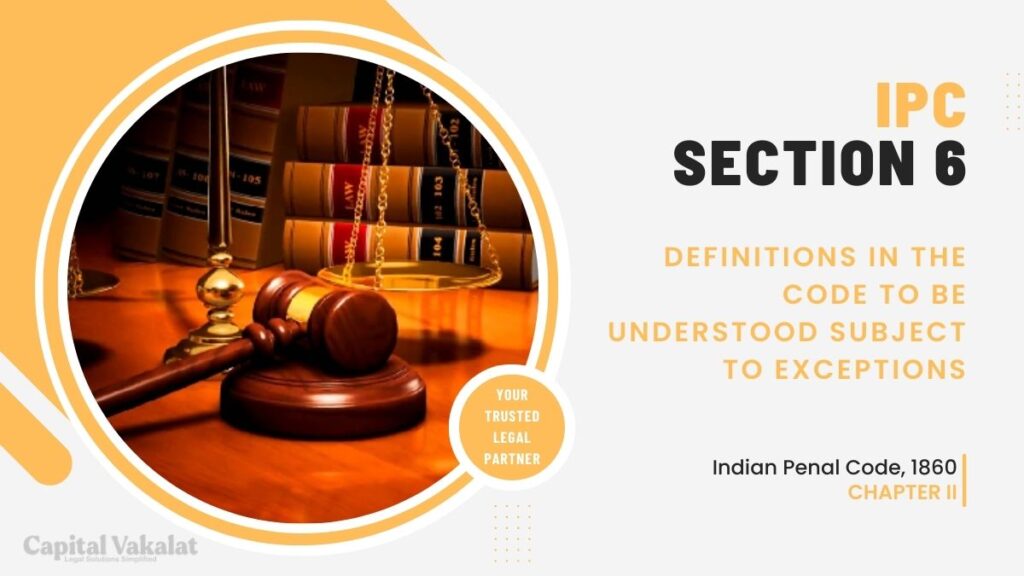In the Indian Penal Code (IPC), Section 6 plays a crucial role in establishing the interpretation of definitions provided within the code. The legal landscape can be complex, but this section provides a framework for understanding the scope of these definitions while taking into account any exceptions that might apply.

Let’s delve into the details of Section 6 IPC and its implications.
Understanding the Significance of Section 6 IPC
At its core, Section 6 of the IPC serves as a guiding light for interpreting the definitions outlined within the code. Definitions play an integral role in any legal framework, as they lay the foundation for how various terms and phrases are to be understood in the context of the law.
The Role of Definitions
Definitions in the IPC serve to provide clarity and precision to the language used in the legal text. They ensure that there is a uniform understanding of specific terms, preventing ambiguity and misunderstandings. However, the complexity arises when certain terms are subject to exceptions.
Navigating Exceptions
Exceptions can be thought of as legal nuances that modify the straightforward understanding of a term or phrase. Section 6 IPC introduces the idea that definitions are subject to exceptions mentioned in the code. These exceptions can alter the applicability or scope of a definition based on specific circumstances.
The Legal Interpretation Framework
When interpreting a provision within the IPC, Section 6 provides guidance on how to approach terms subject to exceptions. It highlights that unless a different intention appears from the context, the definitions provided in the code shall be understood in subject to the exceptions contained within it.
Balancing Act
The task of interpreting definitions subject to exceptions requires a delicate balance. On one hand, the primary definition provides a general understanding, while on the other hand, exceptions tailor that understanding to specific situations. This interplay ensures that justice is served and the law is applied with precision.
Case Precedents and Precedence
Over time, various legal cases have brought Section 6 IPC into the limelight. Courts have deliberated on how to interpret definitions when exceptions are in play. Case precedents have established the importance of giving due consideration to both the definition and its exceptions while delivering judgments.
Protecting Intentions
Section 6 IPC, by emphasizing the importance of context and intentions, safeguards against misinterpretations. It prevents situations where a strict adherence to a definition might lead to an unjust outcome due to exceptional circumstances not taken into account.
Evolving Legal Landscape
As society evolves, so does the need for adapting legal interpretations. Section 6 acknowledges this need by allowing definitions to be nuanced by exceptions, enabling the law to cater to the dynamic nature of human interactions and emerging situations.
Conclusion
In conclusion, Section 6 IPC stands as a cornerstone of legal interpretation within the Indian Penal Code. It ensures that the definitions provided in the code are not rigid, and they can be adapted to various scenarios through exceptions. This adaptability is vital in maintaining a fair and just legal system that can accommodate the complexities of real-life situations.
Here are some external resources that provide detailed information about Section 6 IPC and its implications:
- Indian Penal Code – Section 6 – Read the full text of Section 6 IPC and understand its significance in legal interpretations.
- Indiacode – Understanding Section 6 IPC – A comprehensive analysis of Section 6 IPC, exploring definitions, exceptions, and case precedents.
- Indiankanoon – Interpreting IPC Section 6 – Dive into the nuances of Section 6 IPC, with insights on exceptions and how they impact legal proceedings.
Remember to verify the credibility of these sources before relying on their information for legal matters.
FAQs
Are exceptions the same as amendments?
No, exceptions alter the application of definitions, while amendments change the text itself.
How do courts determine the applicability of exceptions?
Courts analyze the context, intentions, and legal precedents to determine the applicability of exceptions.
Can exceptions lead to contradictory interpretations?
While exceptions can add complexity, courts strive to harmonize definitions and exceptions for a coherent interpretation.
Why is the balance between definitions and exceptions crucial?
This balance ensures that the law is both precise and flexible, adapting to changing circumstances while upholding justice.